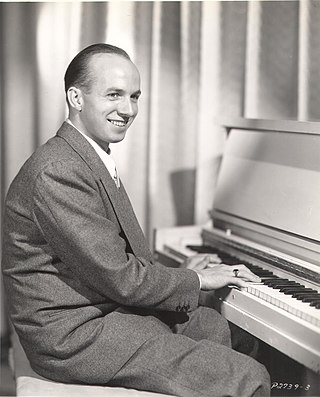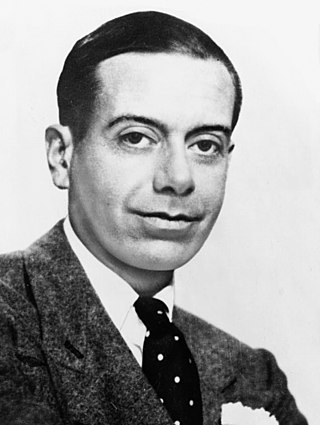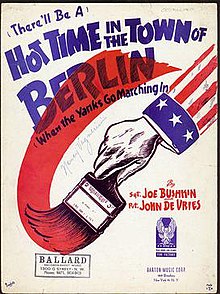
Harry Lillis "Bing" Crosby Jr. was an American singer, actor, television producer, television and radio personality and businessman. The first multimedia star, he was one of the most popular and influential musical artists of the 20th century worldwide. Crosby was a leader in record sales, network radio ratings, and motion picture grosses from 1926 to 1977. He was one of the first global cultural icons. Crosby made over 70 feature films and recorded more than 1,600 songs.

The Andrews Sisters were an American close harmony singing group of the swing and boogie-woogie eras. The group consisted of three sisters: contralto LaVerne Sophia Andrews (1911–1967), soprano Maxene Anglyn Andrews (1916–1995), and mezzo-soprano Patricia Marie Andrews (1918–2013). The sisters have sold an estimated 80 million records. Their 1941 hit "Boogie Woogie Bugle Boy" can be considered an early example of jump blues. Other songs closely associated with the Andrews Sisters include their first major hit, "Bei Mir Bist Du Schön " (1937), "Beer Barrel Polka " (1939), "Beat Me Daddy, Eight to the Bar" (1940), "Don't Sit Under the Apple Tree " (1942), and "Rum and Coca-Cola" (1945), which helped introduce American audiences to calypso.

James Van Heusen was an American composer. He wrote songs for films, television and theater, and won an Emmy and four Academy Awards for Best Original Song.

"Danny Boy" is a song with lyrics written by English lawyer Frederic Weatherly in 1910, and set to the traditional Irish melody of "Londonderry Air" in 1913.
"There's No Business Like Show Business" is an Irving Berlin song, written for the 1946 musical Annie Get Your Gun and orchestrated by Ted Royal. The song, a slightly tongue-in-cheek salute to the glamour and excitement of a life in show business, is sung in the musical by members of Buffalo Bill's Wild West Show in an attempt to persuade Annie Oakley to join the production. It is reprised three times in the musical.

"Let's Do It, Let's Fall in Love" (also known as "Let's Do It (Let's Fall in Love)" or simply "Let's Do It") is a popular song written in 1928 by Cole Porter. It was introduced in Porter's first Broadway success, the musical Paris (1928) by French chanteuse Irène Bordoni, for whom Porter had written the musical as a starring vehicle.

"White Christmas" is an Irving Berlin song reminiscing about an old-fashioned Christmas setting. The song was written by Berlin for the 1942 musical film Holiday Inn. The composition won the Academy Award for Best Original Song at the 15th Academy Awards. Bing Crosby's record topped the Billboard chart for 11 weeks in 1942 and returned to the number one position again in December 1943 and 1944. His version would return to the top 40 a dozen times in subsequent years.
"Ac-Cent-Tchu-Ate the Positive" is a popular song which was published in 1944. The music was written by Harold Arlen and the lyrics by Johnny Mercer. The song was nominated for the Academy Award for Best Original Song at the 18th Academy Awards in 1945 after being used in the film Here Come the Waves.
"All the Way" is a song published in 1957 by Maraville Music Corporation. The music was written by Jimmy Van Heusen with lyrics by Sammy Cahn.
"Without a Song" is a popular song composed by Vincent Youmans with lyrics later added by Billy Rose and Edward Eliscu, published in 1929. It was included in the musical play, Great Day. The play only ran for 36 performances but contained two songs which became famous, "Without a Song" and "Great Day".
"Swinging on a Star" is an American pop standard with music composed by Jimmy Van Heusen and lyrics by Johnny Burke. It was introduced by Bing Crosby in the 1944 film Going My Way, winning an Academy Award for Best Original Song that year, and has been recorded by numerous artists since then. In 2004, it finished at No. 37 in AFI's 100 Years...100 Songs survey of top tunes in American cinema.
"Fugue for Tinhorns" is a song written and composed by Frank Loesser and first performed by Stubby Kaye, Johnny Silver, and Douglas Deane in 1950. The song was featured in the Broadway musical Guys and Dolls.
"Don't Fence Me In" is a popular American song written in 1934, with music by Cole Porter and lyrics by Robert Fletcher and Cole Porter. Members of the Western Writers of America chose it as one of the Top 100 Western songs of all time.
"Sunday, Monday or Always" is a 1943 popular song with music by Jimmy Van Heusen and lyrics by Johnny Burke.
"Witchcraft" is a popular song from 1957 composed by Cy Coleman with lyrics by Carolyn Leigh.

This is a filmography for the American singer and actor Bing Crosby.
For music from an individual year in the 1940s, go to 40 | 41 | 42 | 43 | 44 | 45 | 46 | 47 | 48 | 49
"Ciribiribin" is a merry Piedmontese ballad, originally in three-quarter time, composed by Alberto Pestalozza in 1898 with lyrics by Carlo Tiochet. It quickly became popular and has been recorded by many artists. Decades later it enjoyed continued popularity with swing and jazz bands, played in four-four time.
"The Second Time Around" is a song with words by Sammy Cahn and music by Jimmy Van Heusen. It was introduced in the 1960 film High Time, sung by Bing Crosby with Henry Mancini conducting his orchestra, and was nominated for the Academy Award for Best Original Song. It lost out to "Never on Sunday".

Just a Baby's Prayer at Twilight (For Her Daddy Over There) is a 1918 song composed by M.K. Jerome, with lyrics written by Sam M. Lewis and Joe Young. The song was published by Waterson, Berlin & Snyder Co. The song was performed by Henry Burr and reached number one on the top 100 US songs of 1918. Burr's recording sold a million copies in sheet music and sales.








